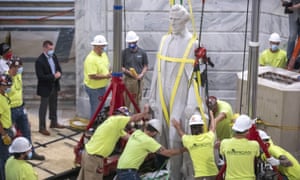Newspaper found in base of marble structure is from 1936, long after the civil war for which Confederate leader is known

Photograph: Ryan C Hermens/AP
Officials supervising the removal of a statue of Jefferson Davis from the Kentucky state capitol on Saturday found items left in its base.
Those who put up the marble statue of the Confederate president left a Glenmore Kentucky Straight Bourbon Whiskey bottle and a newspaper – dated 20 October 1936.
Davis was born in Fairview, Kentucky in 1808 and became a soldier, a senator from Mississippi and US secretary of war. From 1861 to 1865 he led the Confederacy through the American civil war.
“African slavery, as it exists in the United States, is a moral, a social and a political blessing,” he said.
The Confederacy lost the war and slavery was abolished under the 13th amendment, ratified in December 1865. Davis was charged with treason but never tried, having his citizenship stripped instead. He died in New Orleans in 1889.
Though Kentucky remained in the Union during the war, and indeed was the home state of Abraham Lincoln, the presence in its capitol of a statue of a Confederate leader is not particularly unusual. Nor should it seem particularly surprising that the bottle and newspaper found under the Davis statue were from the 1930s.
Southern states erected many of the monuments to Confederate leaders and soldiers that are now the focus of national protests long after the civil war, at the height of the Jim Crow system of racial segregation and repression and later during years of civil rights protest and reform.
During civil unrest sparked by the killing of George Floyd in Minneapolis, Kentucky has seen concerted protests over racism and police brutality. Two deaths in the state have attracted particular attention.
Breonna Taylor, a 26-year-old emergency medical technician, was killed in her home in Louisville in March, by officers conducting a narcotics raid in which no drugs were found.
David McAtee, a 53-year-old restaurant owner, was killed in the same city by national guard troops confronting protesters earlier this month.
Across the US, monuments to the Confederacy have been attacked by protesters. Some have been removed. In Richmond, Virginia this week, a famous statue of Davis on Monument Avenue, the pantheon of Confederate leaders, was forcibly torn down.
But many remain in place. There is even a statue of Davis, given to Congress by Mississippi in 1931, in the US Capitol in Washington.
In 1978, President Jimmy Carter welcomed the restoration of Davis’s US citizenship as the completion of a “long process of reconciliation that has reunited our people following the tragic conflict between the states”.
This week House speaker Nancy Pelosi, another Democrat, called on Republicans who hold the Senate to help remove such works.
The Senate armed services committee has approved an amendment meant to create a commission on renaming US military bases named for Confederate generals.
Donald Trump, who has rejected such calls, spoke on Saturday at the United States Military Academy at West Point. The New York base is home to a barracks named for Confederate general Robert E Lee.
In a tweet on Saturday, Kentucky governor Andy Beshear, a Democrat, said of the Davis statue in Frankfort: “After calling for its removal and urging the Historic Properties Advisory Commission to act, today I pressed the button to bring it down.
“Now, every child who walks into their capitol feels welcome. Today we took a step forward for the betterment of every single Kentuckian.”
Beshear’s Republican predecessor, Matt Bevin, opposed attempts to remove the statue as a “sanitisation of history”. But on Saturday Jason Nemes, a Republican state representative, told the Courier-Journal: “Today is a symbol we are moving ahead. It’s a recognition of the sins of our past.
“We honor our history, the good and the bad, but … I think it’s a wonderful thing that we don’t want to celebrate Jeff Davis anymore.”
On Friday, the Kentucky Historic Properties Advisory Commission voted to move the Davis statue to the site where the Confederate leader was born. From the capitol, state representative Derrick Graham, an African American Democrat, tweeted: “He’s gone, y’all. Glory, Hallelujah!”


